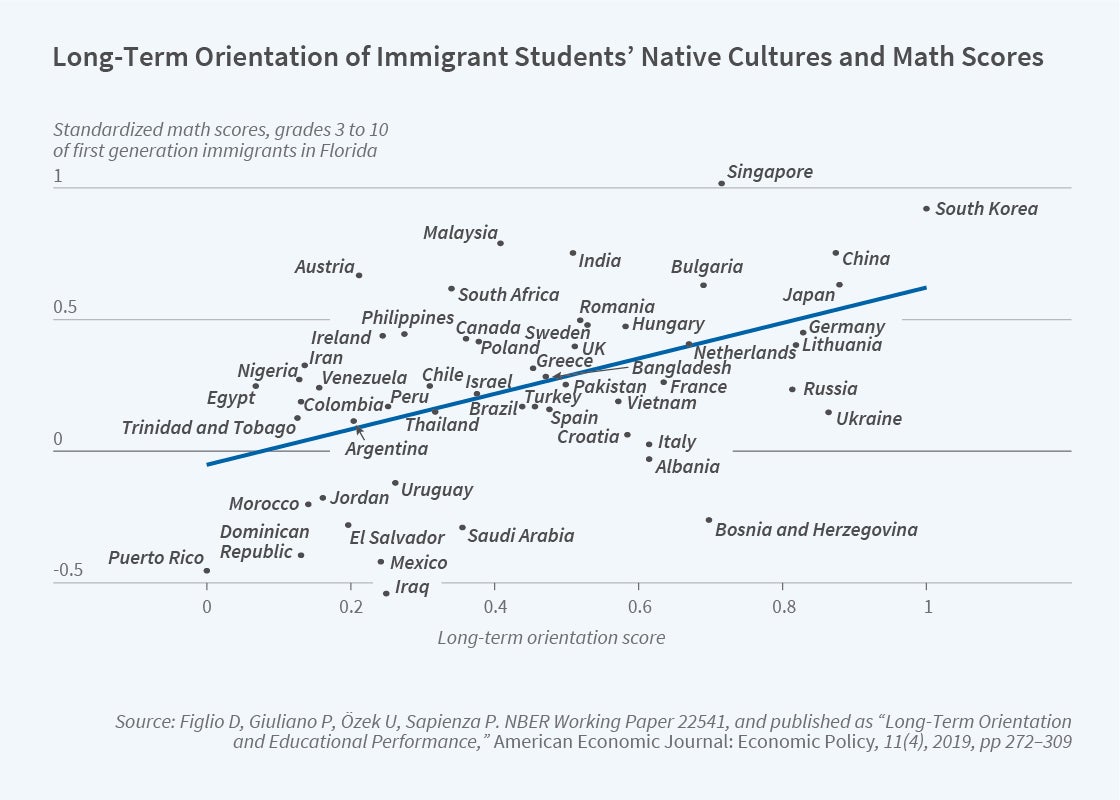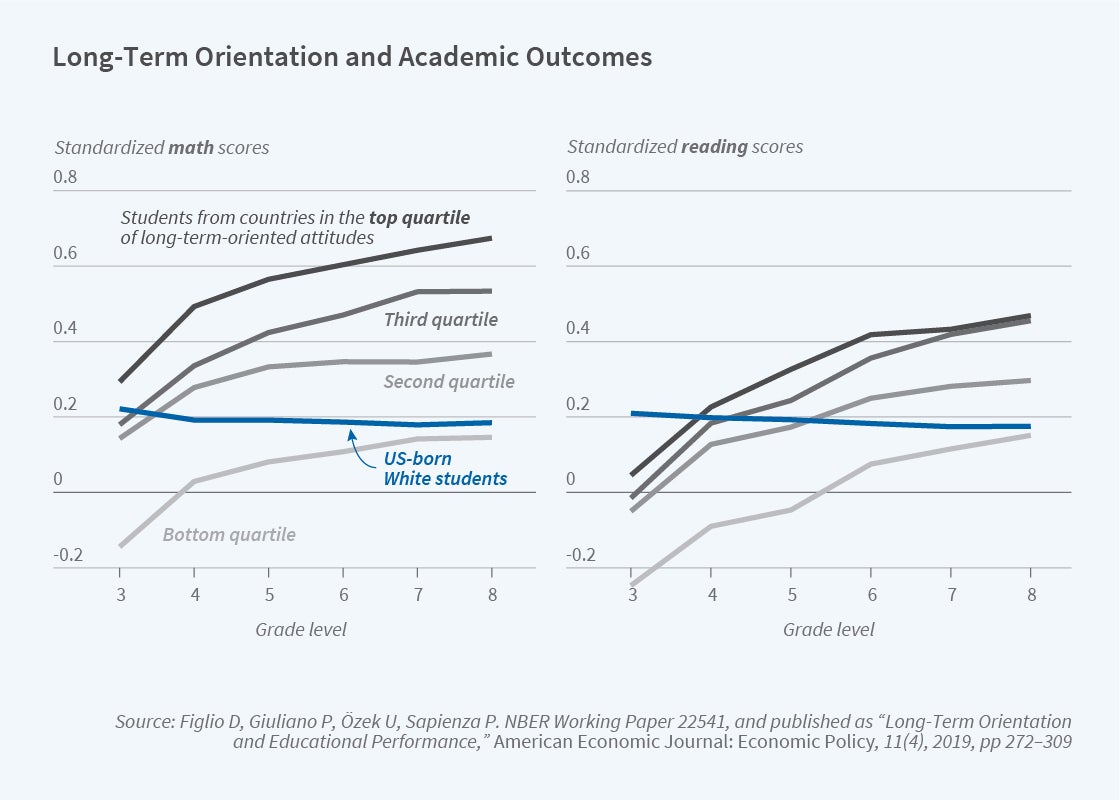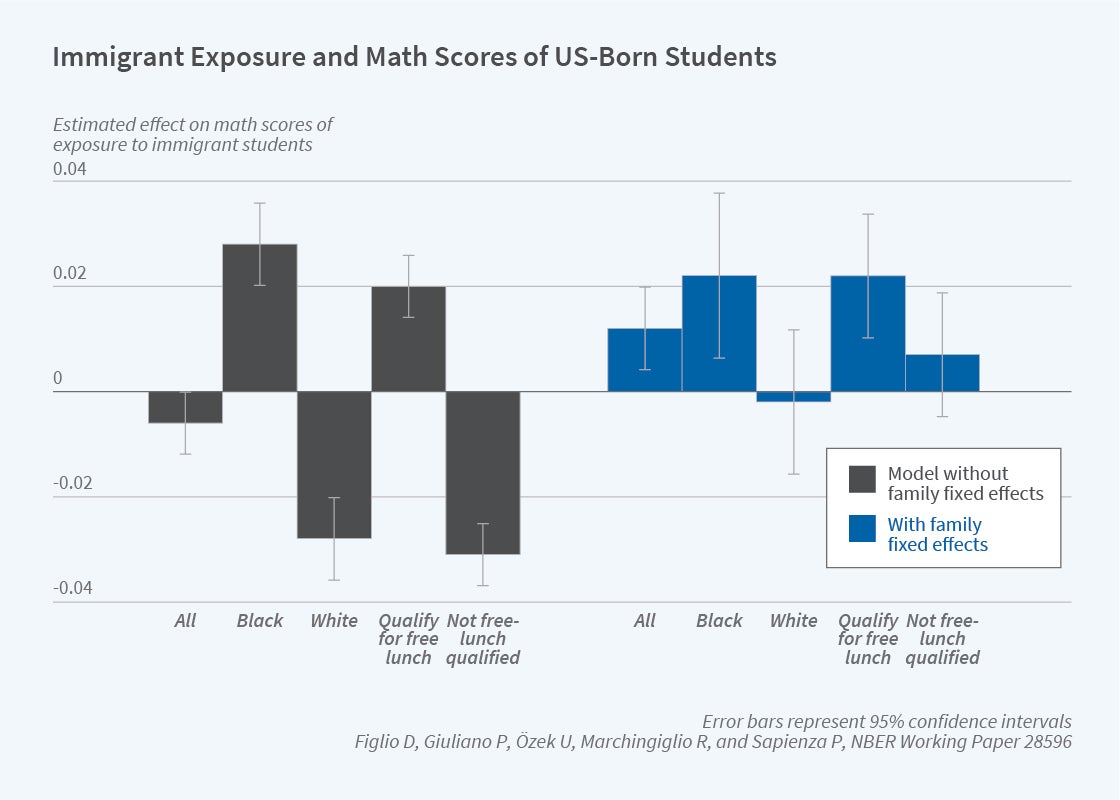Cultural Transmission in Education
In recent decades, economists have studied how beliefs and preferences are formed and updated, and how cultural and social norms affect economic decisions.1 In a series of papers, together with our collaborators, we investigate how vertical and horizontal cultural transmission of preferences may affect educational outcomes.
Long-Term Orientation and Educational Outcomes
In our work with Umut Özek, we study the relevance of one specific cultural value — long-term orientation, the ability to delay gratification and exert self-control.2 This trait has been associated with physical, emotional, and educational outcomes.
We consider the vertical transmission of this cultural value from parents to children and its effect on children’s school performance. To isolate the importance of cultural values, we study first- and second-generation immigrants attending public schools in Florida, one of the states with the largest fraction of immigrants in the United States. Immigrants are almost ideal subjects for the study of vertical transmission because they face the same educational environment as the native born in Florida’s schools but they bring with them the cultural attitudes of their countries of origin. We attribute to each student the long-term orientation of their country of origin by using a well-known cross-country measure.3
We also analyze a large administrative dataset from the Florida Departments of Education and Health containing information on educational outcomes of K-12 students who attended Florida public schools in 2002–03 and 2011–12. School records are merged with birth vital records, which allow for the identification of first- and second-generation immigrants and contain important family background information, such as maternal education.

Figure 1 presents the raw correlations between long-term orientation and one of the educational outcomes studied in the paper, standardized math scores. We find that students who immigrate from countries that emphasize the importance of long-term orientation perform better than immigrants from countries where delayed gratification is not an important cultural value. We control for individual characteristics and school fixed effects. We find not only differences in levels, but also an improvement over time in standardized test scores in mathematics and reading for students from long-term oriented cultures. These students also have fewer absences and disciplinary incidents, they are less likely to repeat a grade, more likely to graduate from high school in four years, and more likely to take advanced-level classes while in high school.
In comparison, Figure 2 plots the average standardized test scores in mathematics and reading by grade of White, US-born students and first-generation immigrants grouped by quartiles of long-term orientation. The performance over time of all the students, including the US-born, is ranked monotonically based on long-term orientation quartiles; the US measure of long-term orientation is 0.26, close to the bottom quartile of the immigrants’ distribution. Also, while the performance of immigrants continues to increase as they progress in school, the performance of US-born students remains flat during their school careers.

Our work emphasizes the role of parents in transmitting cultural values, but also the role of social learning in reinforcing those values. Parents from long-term oriented countries choose higher-rated schools and their children are more likely to join programs for gifted students, controlling for initial conditions. Being in a school with immigrants speaking the same language reinforces the effect of culture.
These results are confirmed with student-level data from a large set of countries using the Programme for International Student Assessment, suggesting that, independent of the school system and the country of destination, the relative performance of immigrants relates to the long-term orientation of the country of origin and it matters for educational outcomes.
Gender Role Attitudes and the Gender Gap in Mathematics
This evidence suggests the importance of upbringing and social environment in shaping individuals’ preferences and beliefs. Since societal gender attitudes have been correlated with a differential performance of boys and girls in mathematics,4 a natural next step is to investigate how much the gender attitudes transmitted by parents can affect the math performance of their daughters. In two papers with Gaia Dossi, we correlate parental gender role attitudes and the academic performance of girls in mathematics using the aforementioned matched birth-school records data from Florida as well as the National Longitudinal Survey of Youth.5
We proxy parental gender preferences by exploiting differential fertility patterns across families. Previous studies have uncovered parental preferences for boys over girls by showing that the number of children in the US is significantly higher in families where the firstborn is a girl.6 In line with previous results for the US, we confirm the existence of a preference for sons over daughters in Florida: many parents who desire to have a male child continue having children until a boy is born. We then identify families with a preference for boys as those who display a fertility stopping behavior in favor of sons.7 We find that girls born in such families perform worse on average on standardized tests in mathematics than girls from other types of families.
Girls raised in “boy-biased” families have around 3 percent of a standard deviation lower math scores than those raised in other families. To put this figure in perspective, this coefficient is around one-quarter the size of the difference between children of mothers who graduated from high school and mothers who did not. Since these preferences are measured before the girls enter school, it is implausible that they reveal a reverse causality from academic performance to preferences for boys.
Next, we investigate whether the transmission of biased preferences is more prevalent among affluent families, in line with the evidence that the gender gap in mathematics is more pronounced in socioeconomically advanced school districts and in families with higher maternal education.8 We use race as a proxy for socioeconomic status because Black students are disproportionately from low-income families compared to White students in the Florida public school system. In the 2010 US Census, the average family income of Black students going to public school was 61 percent of the average income of White students’ families. White girls raised in “boy-biased” families have around 3.5 percent of a standard deviation lower math scores than those raised in other families. These differences are not present among Black girls, where the effect of gender bias is null. We find consistent results when we compare the correlation between parental gender bias in families that receive free or reduced-cost lunches and those that are more affluent.
We validate that gender norms transmitted within the family correlate with daughters’ performance in mathematics by using the National Longitudinal Survey of Youth, in which parental gender attitudes are measured through survey instruments.
Horizontal Transmission in School
Given the importance of culture for educational outcomes and the persistence of attitudes of immigrants across cultures, independent of the institution of destination, a logical next question is whether the attitudes and behaviors of immigrant students affect US-born students. In a paper with Riccardo Marchingiglio and Özek,9 we investigate how cumulative exposure to immigrants over the students’ school career influences the academic achievement of US-born students.
Academic research about the impact of immigrants on the educational outcomes of native-born students faces two empirical challenges due to the selection of both immigrants and native-born students. First, immigrants do not randomly select into schools and are more likely to enroll in schools with students of comparatively disadvantaged background. Second, native-born students, especially those from relatively affluent families, tend to move when immigrant students arrive in their schools — the so-called “native-flight” phenomenon. While previous research has addressed the nonrandom selection of immigrants into schools, data limitations have precluded researchers addressing the nonrandom selection of native-born students.
We address both selection issues using the unique features of the matched birth-school records data from Florida: the longitudinal nature of the data allows us to calculate the cumulative exposure to immigrants during the students’ school life, while the link with the birth certificates enables us to identify siblings and control for all the observable and unobservable family life-cycle characteristics. Our identification therefore comes from within-family, across-siblings variation. The inclusion of the family fixed effect is especially important because research that does not address the nonrandom selection of native-born students is more likely to find a negative correlation between immigrant exposure and native-born students.
Figure 3 presents the results for the overall sample of US-born students speaking English at home, the subsample of White/Black and free lunch/non-free-lunch students, and for two different specifications, with and without the inclusion of family-year fixed effects. The model commonly used in the extant literature, in which school fixed effects only control for the nonrandom assignment of immigrants, yields a significant, small in magnitude, negative correlation between cumulative exposure to immigrants and the academic performance of US-born students. When we include family life-cycle changes, the estimated relationship becomes positive. Accounting for family characteristics is therefore crucial to explain the impact immigrants have on the academic performance of US-born students.

In our study, we also find that sorting is concentrated among White and affluent students, whereas students from lower socioeconomic backgrounds do not move away when immigrants arrive. Looking at different subsamples further indicates that being exposed to immigrant students in school is particularly beneficial for Black and low socioeconomic status (SES) students.
In the sample, moving from the 10th to the 90th percentile of the distribution of cumulative exposure to foreign-born students — 1 percent and 13 percent, respectively — increases the score in mathematics and reading by 2.7 percent and 1.7 percent of a standard deviation, respectively. This effect corresponds to 8.5 percent of the difference in scores between children whose mother has a high school diploma and those whose mother has not completed high school. This effect is twice as large for lower SES and Black students.
Our analysis further suggests that the presence of immigrants does not proxy for demographic and SES school-cohort composition and cannot be explained by different levels of school resources, diversity of the school body, or class segregation. Our results could instead be explained by immigrants always performing better than the US-born students going to school with them or by difficult-to-measure attributes of immigrants such as hard work and resilience. We find that immigrants do not always perform above their US-born peers. Immigrants going to school with Black or low SES students, those benefiting the most from the presence of immigrants, have, on average, better performance and fewer disciplinary incidents than their US-born classmates. However, immigrants going to school with US-born White and affluent students, who are unaffected by them, have lower performance and more disciplinary incidents. Our results are robust to different classifications of students born in Puerto Rico, who are US citizens but are marginalized and often coded as “immigrant” in mainland US settings. Overall, our findings suggest that immigrant students who outperform US-born students have a positive impact on the native born, while immigrants with lower academic achievement do not negatively affect US-born students.
Future Directions
As economics in recent years has increasingly focused on the origin and persistence of cultural norms, our results open new avenues for further exploration. How do preferences change with assimilation and exposure to other students? What roles do schools and teachers play in influencing preferences and beliefs, and how do institutional characteristics and policies interact with cultural upbringing? Future research might help us shed light on these questions.
Endnotes
“Does Culture Affect Economic Outcomes?” Sapienza P, Zingales L, Guiso L. NBER Working Paper 11999, February 2006, and Journal of Economic Perspectives 20(2), Spring 2006, pp. 23–48; “Culture and Institutions,” Alesina A, Giuliano P. NBER Working Paper 19750, December 2013, and Journal of Economic Literature 53(4), December 2015, pp. 898–944.
“Long-Term Orientation and Educational Performance,” Figlio D, Giuliano P, Özek U, Sapienza P. NBER Working Paper 22541, August 2016, and American Economic Journal: Economic Policy 11(4), November 2019, pp. 272–309.
Cultures and Organizations: Software of the Mind: Intercultural Cooperation and Its Importance for Survival, Third edition. Hofstede G, Hofstede GJ, Minkov M. New York: McGraw Hill, 2010.
“Culture, Gender, and Math,” Guiso L, Monte F, Sapienza P, Zingales L. Science 320(5880), May 2008, pp. 1164–1165.
“Born in the Family: Preferences for Boys and the Gender Gap in Math,” Dossi G, Figlio D, Giuliano P, Sapienza P. NBER Working Paper 25535, February 2019, and Journal of Economic Behavior & Organization 183, March 2021, pp. 175–188; “The Family Origin of the Math Gender Gap Is a White Affluent Phenomenon,” Dossi G, Figlio D, Giuliano P, Sapienza P. NBER Working Paper 28326, January 2021, and AEA Papers and Proceedings 111, May 2021, pp. 179–183.
“The Demand for Sons: Evidence from Divorce, Fertility, and Shotgun Marriage,” Dahl G, Moretti E. NBER Working Paper 10281, February 2004. Published as “The Demand for Sons,” Review of Economic Studies 75(4), October 2008, pp. 1085–1120.
“Gender Discrimination in the Family,” Bharadwaj P, Dahl G, Sheth K. In The Economics of the Family, vol. 2, edited by E. Redmount, pp. 237–266. Santa Barbara, CA: ABC-Clio Publishers, 2015.
“Gender Achievement Gaps in US School Districts,” Reardon S, Fahle E, Kalogrides D, Podolsky A, Zárate R. CEPA Working Paper 18-13, 2018; “An Empirical Analysis of the Gender Gap in Mathematics,” Fryer R, Levitt S. American Economic Journal: Applied Economics 2(2), April 2010, pp. 210–240.
“Diversity in Schools: Immigrants and the Educational Performance of US-Born Students,” Figlio D, Giuliano P, Marchingiglio R, Özek U, Sapienza P. NBER Working Paper 28596, March 2021.


